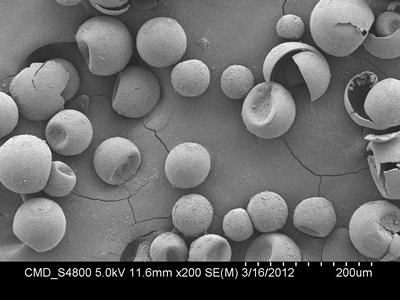Chemistry Staff Seminar Series Seminar
- Time:
- 13:00
- Date:
- 30 October 2013
- Venue:
- Building 27, Room 2001 (L/R 1) Chemistry Highfield Southampton SO17 1BJ
For more information regarding this seminar, please email Dr Darren Bradshaw at D.Bradshaw@soton.ac.uk .
Event details
Staff from chemistry present seminars of their own choice, reflecting the divergence of research being undertaken within chemistry.

Dr Darren Bradshaw
MOF composites and capsules with enhanced properties
Metal organic frameworks (MOFs) are an exciting class of microporous materials accessed via the self-assembly of metal ions or clusters with polytopic organic linkers. The resulting network structures are topologically diverse, have tuneable pore sizes, and display some of the highest surface areas and gas uptake capacities reported to date. Their inherent functionality constitutes a versatile platform for myriad applications, including catalysis, molecular separation, gas storage and drug delivery which are further enhanced by appropriate processing strategies and their incorporation into composite materials.
In this seminar I will briefly discuss our recent work on the preparation of MOFs at functional interfaces to form composite materials, and demonstrate their enhanced performance in applications such as HPLC. Where biopolymer hydrogel matrices are employed, MOF growth chemistry and crystal morphology is carefully regulated in a process that mirrors natural biomineralisation. Finally, MOF-polymer composite capsules have been prepared by the colloidal assembly of pre-formed MOF nanoparticles at the surface of emulsion droplets, which demonstrate selective or pH triggered release of encapsulated species.
Dr Martin Fischlechner
Microfluidic Emulsions and Derivatives for High-Throughput Screening Applications and Materials
Droplet Microfluidics, a technology based on the handling of monodisperse pico- to nanoliter water-in-oil emulsions, allows to process millions of miniaturized compartments that can be used to conduct biological assays. While high-throughput screening systems based on cell survival or for the selection of binders are available, applications that require compartmentalization, for example in directed enzyme evolution, are quite limited in the numbers of samples that can be screened with current technologies.
This talk will give an introduction to microdroplet technology, and present examples on how microfluidic emulsions and their derivatives (e.g. double emulsions and emulsion-templated beads) can be used for screening campaigns as well as for applications in materials science.